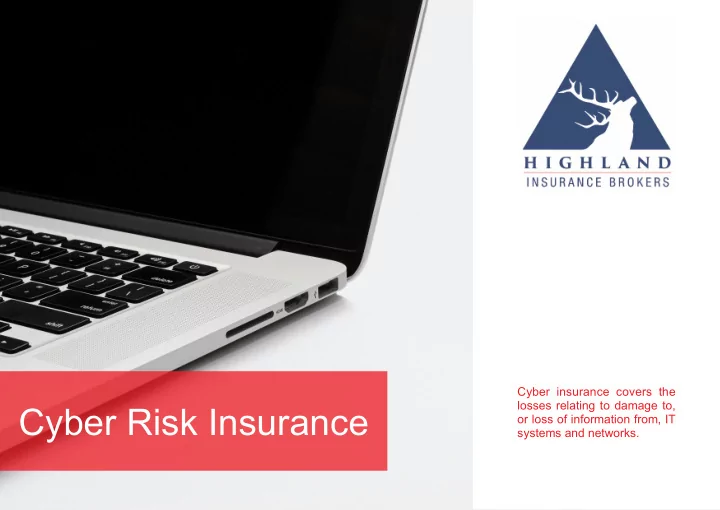

Cyber insurance covers the losses relating to damage to, Cyber Risk Insurance or loss of information from, IT systems and networks.
1. Do I need it? As a business of any size, it is likely you will rely on information technology (IT) infrastructure to some degree. If so, you will be exposed to the risks of business interruption, income loss, damage management and repair, and possibly reputational damage if IT equipment or systems fail or are interrupted. While existing insurance policies such as commercial property, business interruption or professional indemnity insurance, may provide some elements of cover against cyber risks, businesses are increasingly buying specialised cyber insurance policies to supplement their existing insurance arrangements, particularly if they: ● hold sensitive customer details such as names and addresses or banking information; ● rely heavily on IT systems and websites to conduct their business; ● process payment card information as a matter of course.
Cyber insurance covers the losses relating to damage to, or loss of information from, IT systems and networks. Policies generally include significant assistance with and management of the incident itself, which can be essential when faced with reputational damage or regulatory enforcement. Generally cyber risks fall into first party and third party risks. Insurance products exist to cover either or both of these types of risk. First-party insurance covers your business’s own assets. This may include: ● Loss or damage to digital assets such as data or software programmes ● Business interruption from network downtime ● Cyber Extortion where third parties threaten to damage or release data if money is not paid to them 2. What does ● Customer notification expenses when there is a legal or regulatory requirement to notify them of a security or privacy breach it cover? ● Reputational damage arising from a breach of data that results in loss of intellectual property or customers ● Theft of money or digital assets through theft of equipment or electronic theft Third-party insurance covers the assets of others, typically your customers. This may include: ● Security and privacy breaches, and the investigation, defence costs and civil damages associated with them ● Multi-media liability, to cover investigation, defence costs and civil damages arising from defamation, breach of privacy or negligence in publication in electronic or print media ● Loss of third party data, including payment of compensation to customers for denial of access, and failure of software or systems
3. EU General Data Protection Regulations (GDPR) The European Union’s new data protection regulation comes into effect next year. Full information on the regulations are available on the ICO website. Here are five key facts: GDPR applies to all The GDPR applies to all companies worldwide that process personal data of European Union (EU) citizens. This enforcement is also backed by significant fines of up to €20m or 4% of group annual global turnover GDPR widens the definition of personal data Any data that can be used to identify an individual will be considered personal data. This includes, for the first time, things such as genetic, mental, cultural, economic or social information. GDPR introduces a common data breach notification requirement The regulation requires organisations to notify the local data protection authority of a data breach within 72 hours of discovering it. This means organisations need to ensure they have the technologies and processes in place that will enable them to detect and respond to a data breach. GDPR tightens the rules for obtaining valid consent to using personal information Organisations need to ensure they use simple language when asking for consent to collect personal data, they need to be clear about how they will use the information, and they need to understand that silence or inactivity no longer constitutes consent. GDPR introduces the right to be forgotten Organisations will be required not to hold data for any longer than absolutely necessary, and not to change the use of the data from the purpose for which it was originally collected, while – at the same time – they must delete any data at the request of the data subject.
4. Managing As well as putting adequate insurance in place, it is important for you to manage your own cyber risks as a business. This includes: cyber risks ● E valuating first and third party risks associated with the IT systems and networks in your business ● Assessing the potential events that could cause first or third party risks to materialise ● Analysing the controls that are currently in place and whether they need further improvement In 2014 the Government launched Cyber Essentials – a basic cyber security hygiene standard to help organisations protect themselves against common cyber attacks. Considering Cyber Essentials accreditation is a good first step in becoming cyber resilient. Highland Insurance Brokers is Cyber Essentials accredited and is one of the only brokers in Scotland to hold
5. How can we help? We have access to various market leading products from small, pre-priced packages for an “off the shelf” solution, to bespoke packages tailored to meet the needs of a larger business or one with more complex requirements. Contact Don at Highland Insurance Brokers on 01463 01463 709777 or by email don@highlandinsurancebrokers.co.uk Highland Insurance Brokers Limited is an Appointed Representative of Momentum Broker Solutions Limited which is authorised and regulated by the Financial Conduct Authority. The information contained in sections 1, and 4 are from the Association of British Insurers abi.org.uk
Recommend
More recommend